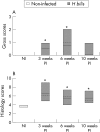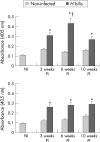Helicobacter bilis triggers persistent immune reactivity to antigens derived from the commensal bacteria in gnotobiotic C3H/HeN mice
- PMID: 17145736
- PMCID: PMC1994361
- DOI: 10.1136/gut.2006.099242
Helicobacter bilis triggers persistent immune reactivity to antigens derived from the commensal bacteria in gnotobiotic C3H/HeN mice
Abstract
Background: Infection with Helicobacter species has been associated with the development of mucosal inflammation and inflammatory bowel disease (IBD) in several mouse models. However, consensus regarding the role of Helicobacter as a model organism to study microbial-induced IBD is confounded by the presence of a complex colonic microbiota.
Aim: To investigate the kinetics and inflammatory effects of immune system activation to commensal bacteria following H bilis colonisation in gnotobiotic mice.
Methods: C3H/HeN mice harbouring an altered Schaedler flora (ASF) were selectively colonised with H bilis and host responses were investigated over a 10-week period. Control mice were colonised only with the defined flora (DF). Tissues were analysed for gross/histopathological lesions, and bacterial antigen-specific antibody and T-cell responses.
Results: Gnotobiotic mice colonised with H bilis developed mild macroscopic and microscopic lesions of typhlocolitis beginning 3 weeks postinfection. ASF-specific IgG responses were demonstrable within 3 weeks, persisted throughout the 10-week study, and presented as a mixed IgG1:IgG2a profile. Lymphocytes recovered from the mesenteric lymph node of H bilis-colonised mice produced increased levels of interferon gamma, tumour necrosis factor alpha (TNFalpha), interleukin 6 (IL6) and IL12 in response to stimulation with commensal- or H bilis-specific bacterial lysates. In contrast, DF mice not colonised with H bilis did not develop immune responses to their resident flora and remained disease free.
Conclusions: Colonisation of gnotobiotic C3H/HeN mice with H bilis perturbs the host's response to its resident flora and induces progressive immune reactivity to commensal bacteria that contributes to the development of immune-mediated intestinal inflammation.
Conflict of interest statement
Competing interests: None declared.
Comment in
-
Helicobacter bilis: bacterial provocateur orchestrates host immune responses to commensal flora in a model of inflammatory bowel disease.Gut. 2007 Jul;56(7):898-900. doi: 10.1136/gut.2006.115428. Gut. 2007. PMID: 17566023 Free PMC article. Review.
Similar articles
-
Induction of differential immune reactivity to members of the flora of gnotobiotic mice following colonization with Helicobacter bilis or Brachyspira hyodysenteriae.Microbes Infect. 2006 May;8(6):1602-10. doi: 10.1016/j.micinf.2006.01.019. Epub 2006 Apr 18. Microbes Infect. 2006. PMID: 16698302
-
Helicobacter bilis: bacterial provocateur orchestrates host immune responses to commensal flora in a model of inflammatory bowel disease.Gut. 2007 Jul;56(7):898-900. doi: 10.1136/gut.2006.115428. Gut. 2007. PMID: 17566023 Free PMC article. Review.
-
Helicobacter bilis infection accelerates and H. hepaticus infection delays the development of colitis in multiple drug resistance-deficient (mdr1a-/-) mice.Am J Pathol. 2002 Feb;160(2):739-51. doi: 10.1016/S0002-9440(10)64894-8. Am J Pathol. 2002. PMID: 11839595 Free PMC article.
-
Helicobacter bilis Infection Alters Mucosal Bacteria and Modulates Colitis Development in Defined Microbiota Mice.Inflamm Bowel Dis. 2016 Nov;22(11):2571-2581. doi: 10.1097/MIB.0000000000000944. Inflamm Bowel Dis. 2016. PMID: 27755267 Free PMC article.
-
Helicobacter bilis Contributes to the Occurrence of Inflammatory Bowel Disease by Inducing Host Immune Disorders.Biomed Res Int. 2022 Aug 9;2022:1837850. doi: 10.1155/2022/1837850. eCollection 2022. Biomed Res Int. 2022. PMID: 35983246 Free PMC article. Review.
Cited by
-
Interactions of Segmented Filamentous Bacteria (Candidatus Savagella) and bacterial drivers in colitis-associated colorectal cancer development.PLoS One. 2020 Jul 24;15(7):e0236595. doi: 10.1371/journal.pone.0236595. eCollection 2020. PLoS One. 2020. PMID: 32706816 Free PMC article.
-
The role of H. pylori infection in gall bladder cancer: clinicopathological study.Tumour Biol. 2015 Sep;36(9):7093-8. doi: 10.1007/s13277-015-3444-9. Epub 2015 Apr 16. Tumour Biol. 2015. PMID: 25877756
-
Segmented filamentous bacteria: commensal microbes with potential effects on research.Comp Med. 2014 Apr;64(2):90-8. Comp Med. 2014. PMID: 24674582 Free PMC article. Review.
-
Enterohepatic helicobacter in ulcerative colitis: potential pathogenic entities?PLoS One. 2011 Feb 23;6(2):e17184. doi: 10.1371/journal.pone.0017184. PLoS One. 2011. PMID: 21383845 Free PMC article.
-
TNFα regulates intestinal organoids from mice with both defined and conventional microbiota.Int J Biol Macromol. 2020 Dec 1;164:548-556. doi: 10.1016/j.ijbiomac.2020.07.176. Epub 2020 Jul 18. Int J Biol Macromol. 2020. PMID: 32693143 Free PMC article.
References
MeSH terms
Substances
Grants and funding
LinkOut - more resources
Full Text Sources
Medical
Miscellaneous






